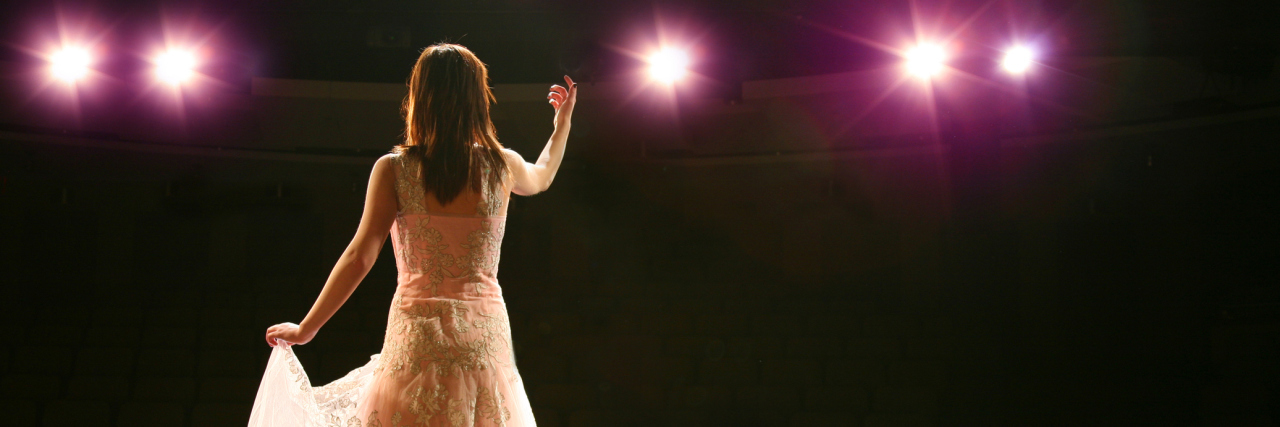I struggle to go more than skin deep. I pass by people. I talk with them briefly. I smile politely and listen to their joys and complaints. I get to know them. I laugh with them, but I’m a shell. And an awfully good actor.
Strangely, when it comes to anything else, I can’t lie to save my life. As a child, if I’d done something, you’d know by the look on my face. It’s against everything I am. Lying doesn’t come easily to me. It’s like sanding wood against the grain – incongruent, rough, destructive.
That’s why I don’t understand how I have kept the biggest secret I’ve ever had for so many people for so long. How I continue to “fake it ’till I make it” all the time. I hate this part of my life. How I have to fudge the truth to keep others comfortable. Chronic pain and depression are topics that seem to be socially unacceptable at times. So, I pretend. I act.
“I’m doing good.” I say over and over, and the guilt kills me.
I feel like I’m lying to their face, but I’ve learned that sometimes I have to protect myself. Sometimes protecting myself means not divulging the truth: I’m doing terribly. Some people are trustworthy and get the truth. Some are not. And sometimes I’m too drained to tell anyone. I just need to get through the day and collapse into bed.
One of the best examples of this was when I was on a high school Mock Trial team. Mock Trial is basically how it sounds: a recreation of actual court. There are witnesses, attorneys, and a judge. It’s much like a play, except that anything can happen. It’s a game of verbal cat and mouse. Points earned by each teammate and added to a total to determine a winner. I was on such a team. It was demanding. We met three days a week for hours. We competed at a high level, and the pressure was immense. The school’s “A Team” won Nationals that year. My team was 0.5 points away from advancing to State (after State is Nationals). We did good. Great, even.
The whole time, I didn’t mutter a word about my health. My debilitating pain, brain fog, and strength-sapping fatigue were hidden under a plastered smile, light pink shirt with a collar, and a pencil skirt. My friends, who I spent hours upon hours with, never knew I was chronically ill. I only ever told one girl, and it was only a quick, embarrassed mutter of information because she caught me crying. Crying, which I did on many occasions, in the bathroom, before running out to go to trial. My friends were confused by my behavior. I didn’t show up to get-togethers or extra practices. Some days, I was lively and cracking jokes, but for the most part, I was quiet and went with what everyone else said. Depending on my pain level and energy, I could be completely different people. No one knew why.
Mock Trial is all about performance and intimidating the competition. You have to pour over the (fictional) case like your life depends on it and have enough confidence to win the trial before it starts. It’s sophisticated acting. Everyone relaxed after the competition was over, but I didn’t. For me, the acting never ended. I’m not sure how I made it through that season. I just did, and to this day, only two of the estimated 40 plus people I interacted and laughed with know anything about my struggles. They don’t know what it’s like to have your joints on fire, stride up in heels, and speak in front of an audience with mind-numbing brain fog. How did I do it? By the skin of my teeth. Why did I do it? I loved it. But was it worth the pain? I’m not sure.
I put on a performance in more ways than one. Sometimes, I feel like that performance has yet to end. I’m often in so much pain I struggle to process what other people are saying, but I laugh on cue and no one suspects a thing. Sure, I’m a little awkward and zone out at strange times, but people chalk it up to shyness or a dull personality. So I survive.
I’m afraid to stop. To just exist. There are many days that I have to push through things I pray no one else I know will ever have to. As I grow older, my sole hope is this: to learn to drop the facade in front of the people who’ve earned my trust. It’s too exhausting to live like I’m on stage all the time. It’s not worth it.
I may not measure up in other’s eyes, but I’m learning to see myself like God does, like my struggling and compassionate mother does, like those who know my deepest aches and pains. The people who truly matter see me as worthwhile, intelligent, witty, and kind- words that I struggle to see myself as – but I’m making progress. I’m learning to see this new, chronic me as no more or less than it is: enough. And what a relief that is.
We want to hear your story. Become a Mighty contributor here.
Getty image by goodynewshoes

